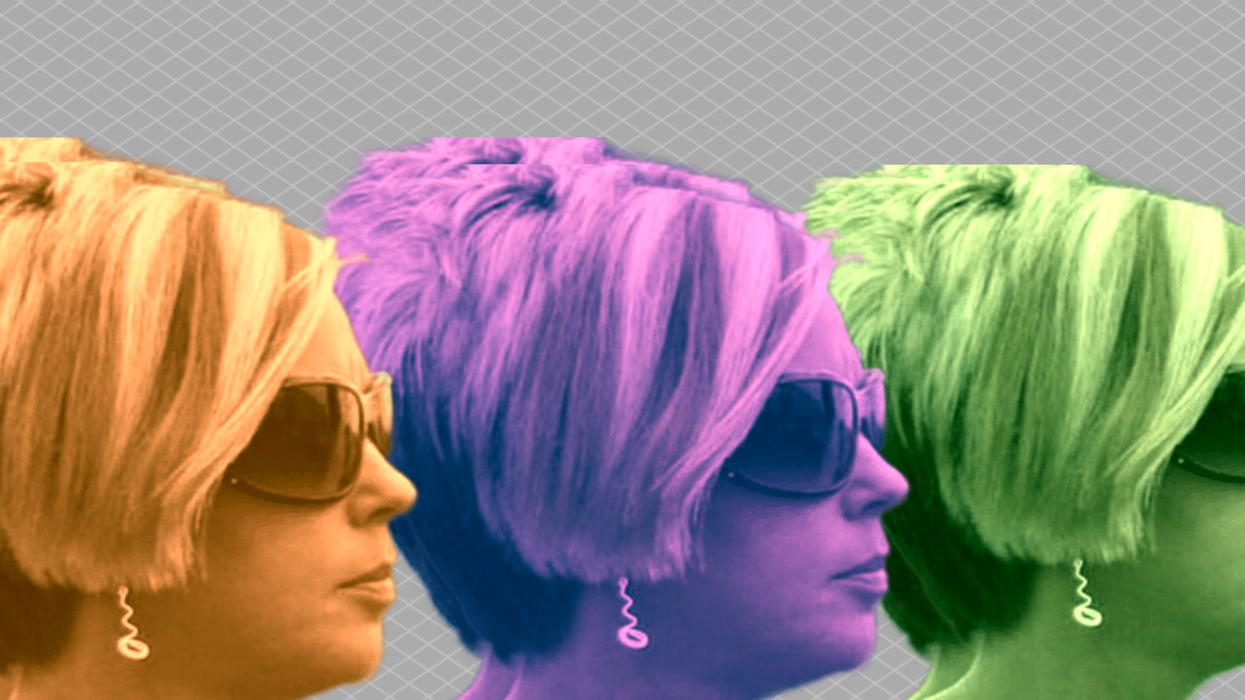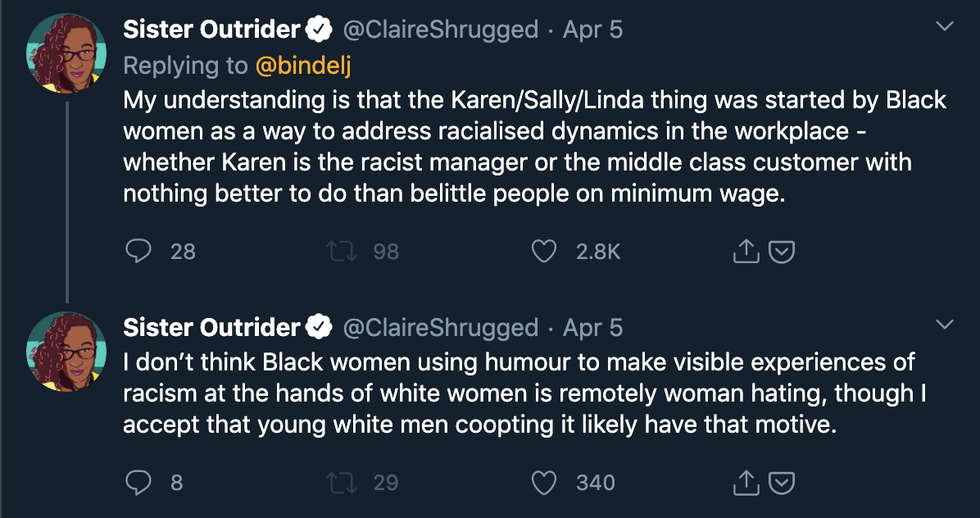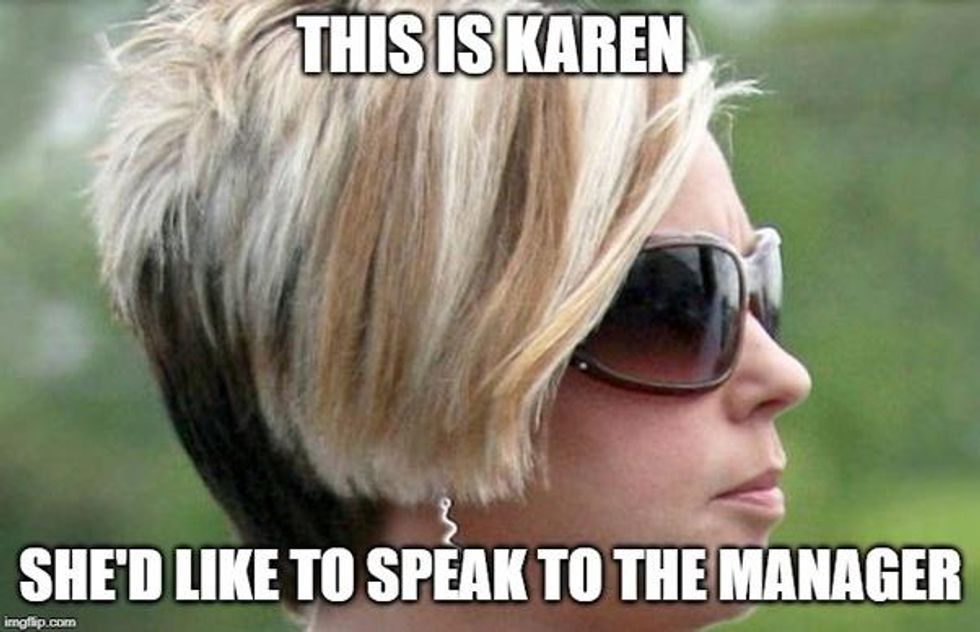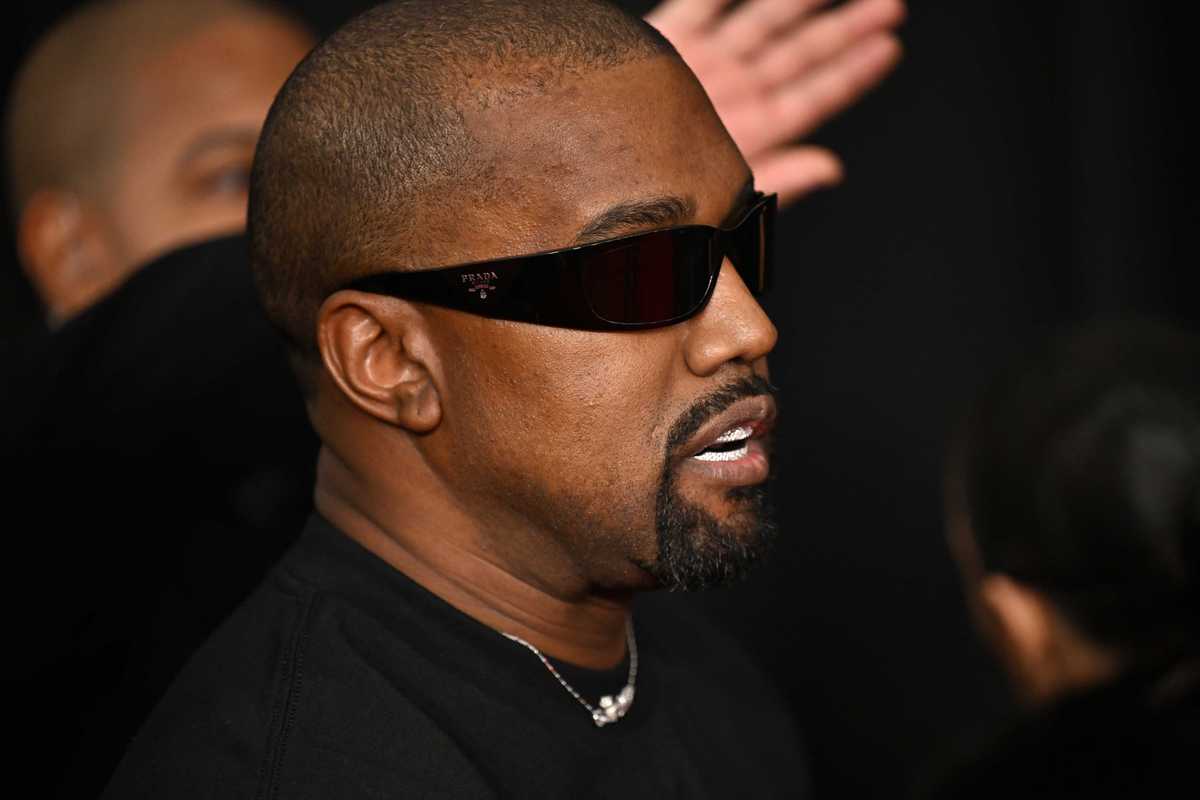Sirena Bergman
Jun 24, 2020

indy100
This has been a bad year to be called Karen... at least if you frequent certain factions of the internet.
But this week it seems the most surprisingly controversial meme of the decade has hit the mainstream, and some people are furious. The arguments cover classism, misogyny and racial tensions. Everyone has thoughts.
The meme? Karen. Yes, "Karen".
Here's what happened...
What is 'Karen'?
Karen isn't really a person, so much as a vibe. In her purest form, Karen is basic. She's white. She's middle-aged. She lives in the suburbs. She's definitely conservative and possibly an anti-vaxxer. She has 38 Twitter followers and the first word on her bio is "mother", but she mostly uses Facebook, where she posts inspirational quotes.
Over and above all else, Karen really, really wants to talk to the manager.
Basically, Karen is entitled, ignorant and all-round insufferable to anyone culturally aware and progressive.
As with most memes, the origins are a little murky. According to Vox, it may have originated on Reddit, when a high schooler created r/FuckYouKaren after a different user gained notoriety for posting embittered diatribes about his ex-wife (whose name is, of course, Karen).
But Karen has been an evocative name for some time. In 2005, comedian Dane Cook released a sketch called "The Friend that Nobody Likes". In it, he refers to this ubiquitous character as "Karen", saying:
Every group has a Karen, and she’s always a bag of douche. And when she’s not around, you just look at each other and go, ‘God, Karen!’
The current iteration of Karen is somewhat removed from this stereotype though. It is largely used as shorthand for a woman who is privileged, snobby and possibly a bit racist (even though "Karen" definitely "has black friends").
Tacking "Karen" onto the end of a tweet calling someone out on these behaviours has become a way of not only symbolising an eye-roll, but also a showing of cultural awareness and understanding of the in-joke. Is it a bit obnoxious? Probably. Is it a slur? Unclear.
The controversy
While there have been murmurings about the use of "Karen" being offensive (namely to women who are actually called Karen) for some time, the debate around whether or not it's a misogynistic meme has kicked off yet again on Twitter again last night.
It started when Sarah Haider, the executive director of an organisation called Ex-Muslims of America, posted a thread of six tweets in which she argued that Karen is a "term of abuse", "corrosive", and even "a more acceptable version of 'c***'".
The original tweet has at the time of writing received 1,700 likes and even more replies, many of which vehemently disagree with her point of view
One notable dissenter is an actual literal Karen, Karen Attiah, a Black Washington Post journalist. She tweeted in response and received 4,200 likes. Clearly people disagree,
She followed up with another tweet in which she tries to put things into perspective:
If all this sounds familiar, it's because a similar debate kicked off on British Twitter a couple of months ago.
At the time, it seemed that the "Karen" meme had... well, some may say "evolved" from its American origins; if one were to be less generous we may say it's been grossly misused. But it seems something similar is now happening across the Atlantic.
While the coronavirus epidemic has brought many communities together, it has also exacerbated divisions fuelled resentment and anger.
First, boomers were blaming millennials for going to the pub (despite little evidence to suggest doing so was a generational issue), millennials en masse responded "ok boomer" – further infuriating their elders – and started tweeting incessantly about the pain of trying keep their blase parents in the house. People are raging at each other for sunbathing in parks, while those cooped up in small flats are quick to lash out at the privileged who own a garden.
None of this has been helped by a complete lack of clarity from either British or American governments, leaving people anxious, confused and quick to lash out.
Enter: Karen.
People who had never used a meme before in their lives began to use the word to essentially just mean "stupid and selfish". Karen was suddenly anyone who was perceived to be social distancing incorrectly, or not taking things seriously enough. People are dying, Karen.
As a result, a lot of the nuance of the real meaning of the meme was lost on the people criticising it, and others were quick to clap back.
There's four main pillars to this debate, and none are easy to wade into. Here's an overview.
The gender issue
This is perhaps the argument that has the most (longest?) legs. It's true that "Karen" is obviously a gendered name, and used specifically to mock and ridicule women. And while male equivalents have entered the lexicon (namely in the form of "Chad" on Twitter and "Kyle" on Reddit) they have not gained anywhere near the same level of notoriety.
But does this make the meme inherently sexist, or simply reflect a world in which women are judged so much more harshly than men in almost every way?
On social media in particular (and Twitter especially), abuse against women is rife. A 2018 study from Amnesty International showed that every 30 seconds a woman receives harassing or abusive messages from men on Twitter. Many of these insults will likely be misogynistic slurs, which stereotype and degrade women based on their gender. There are undoubtedly people who use Karen in the same way, but it's worth noting that the meme itself doesn't necessarily reflect that.
There are countless words which are usurped by trolls as a way to insult women, but that doesn't make the words inherently misogynistic. In fact, as the reclamation of words which have historically been used to debase women ("slut", "fat", "bitch") has taught us , words in and of themselves carry no inherent meaning, they simply amplify the intent with which they have been used.
In the case of Karen, we're seeing the opposite phenomenon – a word which was given its current meaning largely by a certain demographic of women has been co-opted to (in this case, it seems, largely accidentally) and given connotations which could understandably be perceived as being sexist.
The intersection between language and gender is complex. Calling someone "stupid man" doesn't have the same baggage as calling someone a "stupid woman", for example. And there are countless terms which are used only to refer to women, which are perceived negatively compared to their counterpart used for men (bossy vs confident; needy vs sensitive and so on ad nauseam).
What can we learn from this? That intent – and indeed context – really really matters.
Karen is mostly used by women. It's mostly used to refer to other (way more privileged) women. This of course doesn't insulate it from the sexist undercurrents which permeate pretty much all the ways in which we communicate in the world. But calling it a "misogynistic slur" does feel a bit far.
The race issue
As previously stated, Karen – in her original iteration – is undeniably white. This is important because a lot of the behaviour she manifests is inherently linked to her white privilege.
Author Claire Shrugged explained this in a series of tweets back in April when the argument kicked off in the UK, disputing the claim that Karen is a misogynistic slur. Following days of abuse in response, Shrugged says she was doxxed, and has since had to lock her account. But here are screenshots of her tweets (which are still up).

While many backed up her point, some refused to accept it, and even went as far as to state that "Karen" is the equivalent of the N-word but for "white women" – a claim so patently absurd it's barely worth addressing. But just in case, here's what women of colour had to say about it.
Not to mention the (blindingly obvious) fact that there are many women who are not white who are called Karen, such as Attiah.
We spoke to entrepreneur and philanthropist Karen Civil. She's unbothered:
It's an online joke of a white woman who complains to upper management about the tiniest issues or infractions. It doesn't cause any issues in my life so I take it in stride... since it's not a term based towards me in particular.
Karen Bryson is an actor in Netflix's Safe. She told indy100:
This is the most ridiculous thing I’ve heard! It’s clearly a U.S cultural reference. I hardly look like a white, privileged middle class ‘blonde’ woman. My name is Karen.
It’s interesting that it’s a woman’s name. The ‘type’ they have a problem with, comes in both human forms. The fact that the personification of this ‘type’ of person is female. BUT. I think the whole argument/debate is missing the point, or past the point now. A muddled unclear mess and totally counterproductive.
We have a global pandemic we are all collectively fighting and such negativity in these uncertain and frightening times is just tosh.
A reminder for everyone who's been sitting at the back for the past handful of decades: There.👏 Is.👏 No.👏 Such.👏 Thing.👏 As.👏 Reverse.👏 Racism.
You cannot be racist towards white people in the Western world because white people are – by virtue of their racial privilege – in a position of power. Yes, it is possible to make problematic generalisations and rely on derogatory stereotypes, but racism is rooted in structural inequality which is upheld by a social perception that white fragility matters more than actual real systemic discrimination against people of colour.
In short, terrible take. Take a seat. Mind the bin on your way down.
The class issue
One of the more ludicrous curious elements of the "Karen" discourse surrounded the concept of class, and the idea that the term is used as a dog-whistle to refer to working class women. The idea being that all the traits associated with Karen 2.0 (ignorant, loud, rude, selfish) are also ones which snobbish, bigoted middle and upper classes will perceive from their working class counterparts.
Of course you will remember that in the original meme Karen is clearly depicted as suburban and well-off. Not to mention the fact that it originated in the US, where perceptions of class are pretty different from the UK (where all of the class-related Karen discourse we could find seemed to be based).
People tried really hard to argue that "Karen" in an inherently working class name, and came off looking pretty bad because of it.
As we surely determined during the great Katie Hopkins debacle of 2013 – names are not attached to a "class", and people form their own (often utterly ridiculous) associations about this with absolutely no grounding in fact.
Words which are used as derogatory terms for working classes (see: ch*v) are hugely problematic and should rightly be called out. But to put "Karen" in the same category seems at best a misunderstanding and at worst a worrying betrayal of the real bigotry of the people actually making those claims.
The age issue
Finally, we get to what is perhaps the crux of it all: ageism. Because a lot of the discourse around "Karen" feels wildly similar to the great "ok boomer" debate of 2019, right down to the horrifyingly ill-judged comparisons to the N-word.
The past decade has seen what feels like an unprecedented level of intergenerational warfare. The reasons behind this are complex and their unpacking merits its own article (and, rightly – if exhaustingly – many have been written). Suffice to say that while millennials all have "lots of boomer friends!" and every boomer out there has "children who are millennials!", we can't help but expend a lot of online energy criticising each other.
Many of the women taking offence at Karen appeared to be over the age of about 40. It is a fact universally acknowledged that this is not the demographic most likely to be au fait with the meme du jour (although I have no doubt their French is better than mine so RIP my mentions).
Yes, Karen is relatively synonymous with middle-aged. But according to Wikipedia (via a site called "NamePlayground" so make of that what you will) the name Karen peaked at third most popular name for a girl in 1965. If this is accurate, we can assume the majority of Karens are around 55 now, meaning the implication is... kind of accurate?
Not the perceived implication that all middle-aged women are Karens of course, but that almost all Karens are middle-aged women.
While ageism is certainly an issue (particularly for women) in particular spaces, being over 39 is not synonymous with being oppressed.
IFS figures from 2019 show that by the age of 27, 25 per cent of those born in the late 1980s would own a home, compared to 33 per cent of those born in the early 80s, and 43 per cent of people born in the late 70s. Millennials also need £80,000 more in retirement savings than their grandparents in order to retire at the same age. This is especially poignant when you consider that millennials earn 20 per cent less than boomers did at the same age (despite being better educated) and are actually less likely to even get the jobs in the first place.
Not to mention the fact that we experience worryingly high rates of anxiety and depression (graduating into a recession and spending the subsequent 10 years being belittled by your elders can do that to you, we've heard), yet can't afford to actually treat their mental health issues.
So can we maybe just have Karen? Just this one thing, please?
Top 100
The Conversation (0)














